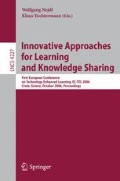Abstract
The combination of the traditional form of education and e-learning activities (blended learning) constitutes an important possibility for the higher education, so that they reach the flexibility which is considered to be necessary for their adaptation to the trainees’ needs within the frame of socio-cognitive needs created by the information society. We present the principles of the application of blended lesson designs in graduate level and of its evaluation by the students. Based on our experience we support the opinion that the blended design may constitute the most important example of the organization of education in the information society. Could cope also with the needs and characteristics of lifelong learning, as it seems to provide both the necessary flexibility and the support for the development of the skills for the management of technology and time which are not confirmed by the traditional designs.
Access this chapter
Tax calculation will be finalised at checkout
Purchases are for personal use only
Preview
Unable to display preview. Download preview PDF.
References
Aycock, Garnham, Kalet: Lessons Learned from the Blended Course Project. Teaching with Technology Today 8(6), 9–21 (2002)
Garrison, D.R., Cleveland-Iness, M.: Critical factors in student satisfaction and success: Facilitating student role adjustment in online communities of inquiry. In: The Sloan Consortium Asynchronous Learning Network Invitational Workshop, Boston (2003)
Garrison, D.R., Kanuka, H.: Blended learning: Uncovering its transformative potential in higher education. Internet and Higher Education 7, 95–105 (2004)
Hamburg, I., Cernian, O., Thij, H.: Blended Learning and Distributed learning Environments. In: ViReC e-Initiative project (2002), Online (retrieved March 15, 2005), from: http://cs.ucv.ro/ViReC
Hicks, M., Reid, I., George, R.: Enhancing on-line teaching: Designing responsive learning environments. The International Journal for Academic Development 6(2), 143–151 (2001)
Leh, A.: Action Research on Blended Courses and their Online Communities. Educational Media International 39(1), 31–38 (2002)
Moore, M.G.: Theory of transactional distance. In: Keegan, D. (ed.) Theoretical principles of distance education, pp. 22–38. Routledge, London (1993)
Swan, K.: Virtual Interaction: Design factors affecting student satisfaction and perceived learning in asynchronous online course. Distance education 22(2), 306–331 (2001)
Wiggins, G., Mc Tighe, J.: What is Backward Design?. ASCD Books for Educators NEWS (2000)
University of Birmingham, Online retrieved (March 23, 2005), from: www.ao.bham.ac.uk/aps/glossary.htm
Author information
Authors and Affiliations
Editor information
Editors and Affiliations
Rights and permissions
Copyright information
© 2006 Springer-Verlag Berlin Heidelberg
About this paper
Cite this paper
Liotsios, K., Demetriadis, S., Pombortsis, A. (2006). Blended Learning Technologies in Lifelong Education: Lessons Learned from a Case Study. In: Nejdl, W., Tochtermann, K. (eds) Innovative Approaches for Learning and Knowledge Sharing. EC-TEL 2006. Lecture Notes in Computer Science, vol 4227. Springer, Berlin, Heidelberg. https://doi.org/10.1007/11876663_65
Download citation
DOI: https://doi.org/10.1007/11876663_65
Publisher Name: Springer, Berlin, Heidelberg
Print ISBN: 978-3-540-45777-0
Online ISBN: 978-3-540-46234-7
eBook Packages: Computer ScienceComputer Science (R0)

